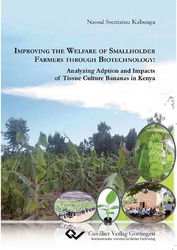| Departments | |
|---|---|
| Book Series (97) |
1381
|
| Nachhaltigkeit |
3
|
| Gesundheitswesen |
1
|
| Humanities |
2370
|
| Natural Sciences |
5407
|
| Mathematics | 228 |
| Informatics | 319 |
| Physics | 980 |
| Chemistry | 1364 |
| Geosciences | 131 |
| Human medicine | 243 |
| Stomatology | 10 |
| Veterinary medicine | 108 |
| Pharmacy | 147 |
| Biology | 835 |
| Biochemistry, molecular biology, gene technology | 121 |
| Biophysics | 25 |
| Domestic and nutritional science | 45 |
| Agricultural science | 1005 |
| Forest science | 201 |
| Horticultural science | 20 |
| Environmental research, ecology and landscape conservation | 148 |
| Engineering |
1798
|
| Common |
98
|
|
Leitlinien Unfallchirurgie
5. Auflage bestellen |
|
Advanced Search
Improving the Welfare of Smallholder Farmers through Biotechnology (English shop)
Analyzing Adption and Impacts of Tissue Culture Bananas in Kenya
Nassul Ssentamu Kabunga (Author)Preview
Table of Contents, Datei (91 KB)
Extract, Datei (110 KB)
Despite economic growths observed over the last half-century, global poverty and hunger still remain big challenges to overcome. Most of the poor people live in rural areas and depend on agriculture for livelihood. Advancements and access to agricultural innovations and skills are thus essential components for mass poverty alleviation. Apparently, a wide range of agricultural technologies are readily available for potential uptake; some of these technologies are specifically devised to address productivity improvements in crops that would otherwise be difficult to breed conventionally. However, the rate and scale of adoption of these technologies in developing countries is still less than expected. Technology adoption rates are even much lower in sub-Saharan Africa, a region that is persistently characterized by stagnated economic growth rates and deteriorating welfare conditions for its citizens.
Literature on agricultural technology adoption and its actual or potential impacts in developing countries is vast. However, the general understanding of these effects is still hampered by the limited scope of robust economic studies. Particularly, most new technologies require farmers to substantially change traditional production practices in order to make significant gains, which often also requires access to new information and complementary input resources. The failure for existing studies to give considerable empirical detail to information and other related institutional constraints as well as the role of complementary inputs limits avenues for wider policy making. Moreover, it is reasonable that impact studies address broader welfare outcomes such as, the net effects of new technology on household income and food security. Although relatively more empirical evidence is available for income, quite little is known about the effect of new technology on improving household food security. The latter could be partly due to the conceptual complexities and costs involved in estimating household food security.
| ISBN-13 (Printausgabe) | 3869559551 |
| ISBN-13 (Hard Copy) | 9783869559551 |
| ISBN-13 (eBook) | 9783736939554 |
| Final Book Format | A5 |
| Language | English |
| Page Number | 167 |
| Lamination of Cover | glossy |
| Edition | 1 Aufl. |
| Volume | 0 |
| Publication Place | Göttingen |
| Place of Dissertation | Göttingen |
| Publication Date | 2011-12-02 |
| General Categorization | Dissertation |
| Departments |
Agricultural science
|








